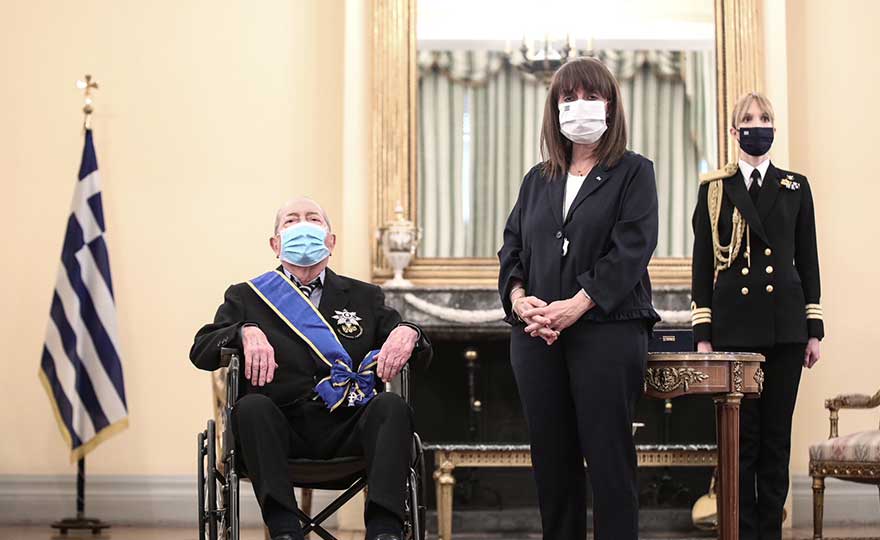The Greek public was really shocked by the recent donation of the shipowner Iakovos Tsounis to the "Saints", as he calls them, by the Greek Armed Forces, worth 23 million euros for the defense of the country and 60 landing craft.
An act for which he was awarded on February 24, 2021 the Order of the Grand Cross of the Order of Honor by the President of the Hellenic Republic Mrs. Katerina Sakellaropoulou.

Indeed, there are many who compare him directly with the national benefactor George Averoff, as in the past he has contributed financially to the renovation of entire wards and clinics in the country's military hospitals, to the construction of churches and museums, while "quietly" has developed a quiet work.
Iakovos Tsounis was born in Patras and is a descendant of the fighters of 1821, Lontaea and Petmezai. He fought at the age of 16 in the Greek-Italian war of 1940. He started as a customs officer in Piraeus. In 1966 he entered shipping as a shipowner, acquiring a total of 13 merchant ships and forming a large fortune. Since then, his great charitable activity begins. His creation is also the Museum, which is located next to his permanent residence on Kyprou Street, in Papagou.
Is it really possible for these actions and his donation to be evaluated politically? Is it possible for them to enter and be characterized by the political microscope? Are they acts of internationalism, patriotism or do they contribute purely to a nationalist outburst between neighboring states with unforeseen consequences?
First of all, internationalism is a set of perceptions that promote the strengthening of relations between peoples and nations. It accepts the existence of nations and the need for equality between them, in contrast to the nationalist and racist perceptions that have been the root cause of genocide and ethnic cleansing from the 19th century to the present day.
At the same time, patriotism is the feeling of love and devotion of the individual to a homeland and coexistence with other citizens who have the same feeling. Patriotism adopts as its basic principle that homeland means freedom of a people, who wants to live free with national pride among other peoples, respects diversity, is opposed to any form of homogenization and thus the concept of patriotism acquires universality, since it promotes the peaceful coexistence of peoples.
Then nationalism is essentially identified with the creation of a political entity that is sovereign and separate for each nation, free from outside interference, as the nation is the natural and ideal basis for a state and rightfully the only source of political power. Nationalism aims to build and maintain a single national identity, based on common social characteristics such as culture, nationality, geographical location, language, politics, religion, traditions and belief in a common unique history, the but which are examined on the basis of a bipolar upper-lower nation with emphasis on the above parameters and which reduce as a primary value the dominance of one nation over another in the context of a perpetual confrontation.
The reason articulated by nationalism is supranational, as it is addressed to a society of states, into which the nationalist group or state enters, while the articulated articulation of a patriotic ethnic group is national, as it is addressed to an ethnocratic environment.
The very existence, existence and preservation of the ethnocratic environment of Greece, and of course of Cyprus, which stems from the need for equality between peoples, as understood by internationalism but also requires the need for peaceful coexistence of peoples between them , which is based on both patriotism and the international principle of the balance of power, characterize the charitable action and donation of Iakovos Tsounis.
An offer of a man driven by feelings of democratic patriotism, which are the strongest antidote to the threatening rise of nationalist movements in Europe, as they clearly demonstrate the catalytic difference in the love of an ethnocentric environment, understood as the homeland and community of free citizens by the idea of free citizens. nationalist entity, understood as a culturally homogeneous community.
Only superficial serological differentiation brings to mind the aggressive meaning of the concept of "nationalism" which is replaced by the positive connotation of the concept of "patriotism" or "national consciousness".
Indeed, Iakovos Tsounis, honored by the Chief of General Staff Mr. Konstantinos Floros, awarded to the honorary lieutenant general, said characteristically that: "Despite the wealth I acquired, as I came barefoot, so I want to leave. My last contract is what I have to go there… The most important thing for me is the patriot. Not the one who has money, not the one who has honors! "Without a homeland, neither wealth, nor glory, nor joys exist!"
This saying of the wonderful man mentally refers me to the famous phrase of Albert Camus: "I love my country too much, to be a nationalist !!".
It is the wish of every patriot, whether he lives in the Cypriot, metropolitan or all-Hellenic world, that others follow the bright and selfless example of 97-year-old Iakovos Tsounis, especially people who hold equal economic status, realizing that there is no greater good than a free good.
And believe me, they are not few either in Greece or especially in our semi-occupied Cyprus…
* Dr. Alexios Ch. Konstantinou, Lawyer / Academic, Candidate MP for Famagusta with the "Solidarity" Movement
